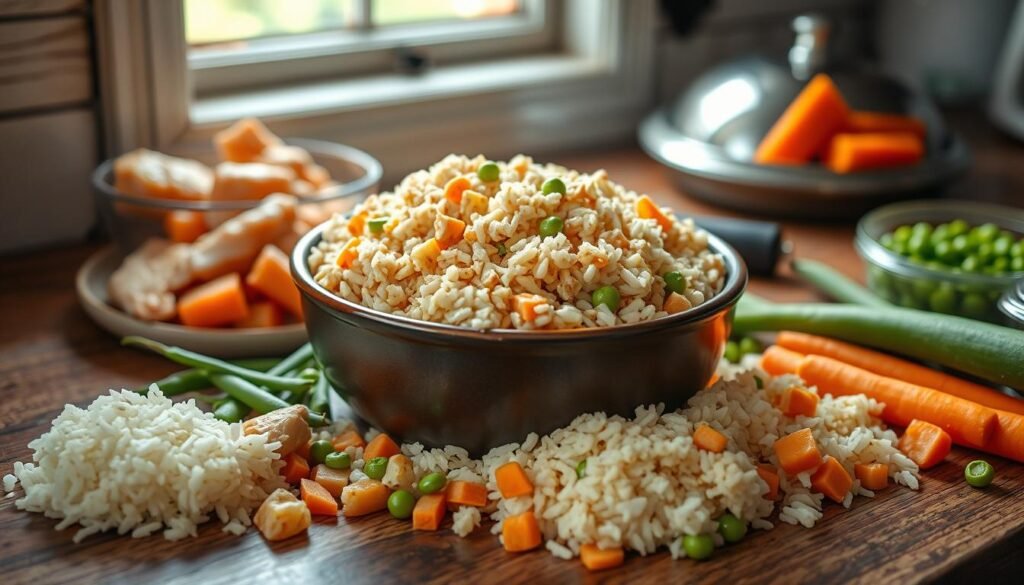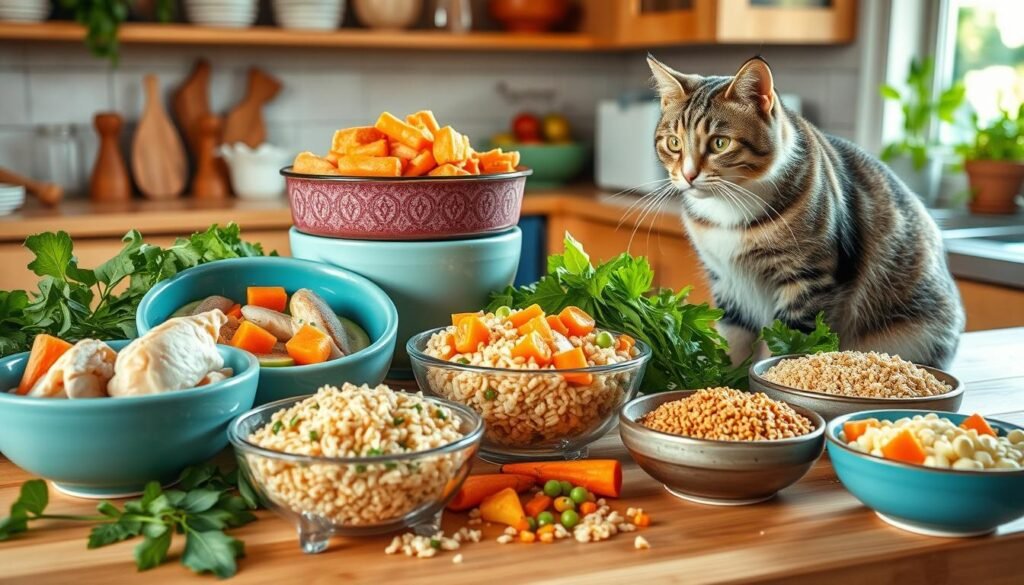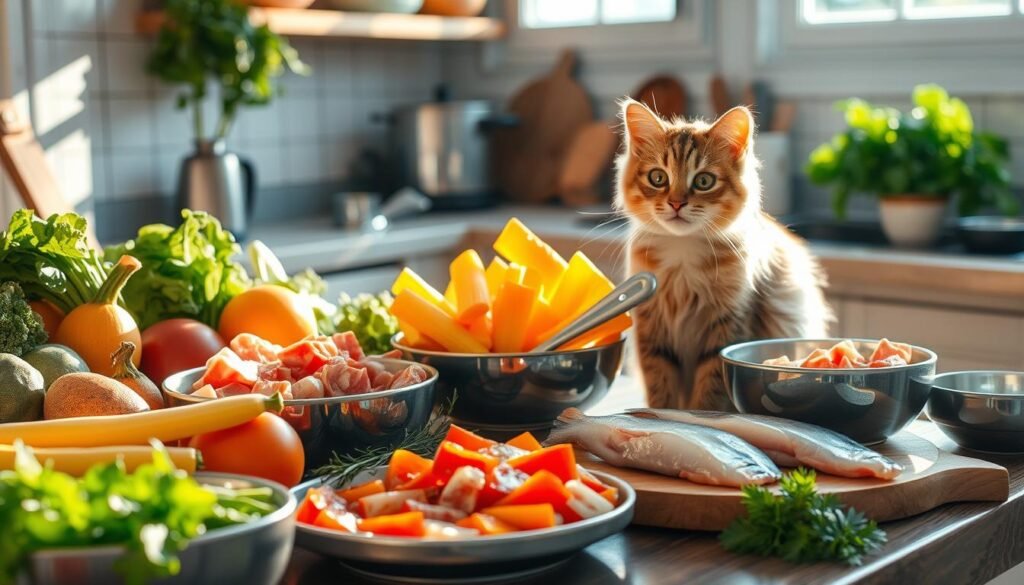Did you know 77% of pet owners make homemade cat food to keep their cats healthy1? We know how vital it is to feed our cats well. This ensures they live long, stay healthy, and feel their best. Making healthy cat food at home lets us pick the best ingredients and meet each cat’s special needs.
Homemade cat food avoids common allergens and digestive issues found in store-bought food2. We can use top-quality proteins like chicken, turkey, rabbit, and pork. These make tasty meals that our cats love1. Learning to make healthy cat food means we can give our cats the best nutrition for their well-being.
Key Takeaways
- Homemade cat food recipes allow pet owners to control the quality and composition of ingredients to meet their cat’s specific dietary needs.
- Incorporating a variety of lean protein sources, such as chicken, turkey, beef, pork, and rabbit, can provide complete and balanced nutrition for cats.
- Homemade cat food can be free from preservatives, artificial colors, and flavors, providing a more natural and nutrient-dense option.
- Consulting with a veterinarian is critical when switching to homemade cat food to ensure safety and proper nutrition.
- Homemade cat food can lead to long-term savings, which is great for pet owners with more than one cat.
The Importance of Homemade Cat Food
Feeding your cat homemade food has many benefits for their health3. You can avoid fillers, preservatives, and additives found in store-bought cat food3. This lets you tailor their diet to their needs and likes, like adding their favorite proteins.
Benefits of Homemade Cat Food
Homemade cat food uses fresh, high-quality ingredients3. It’s often more appealing to cats because it’s like their natural diet3. Plus, making it can be a fun way to bond with your cat.
Controlling Ingredients and Avoiding Allergens
With homemade food, you control what goes in3. This means you can skip allergens and fillers found in commercial food3. You can make sure your cat gets a balanced, healthy meal.
“Homemade cat food doesn’t include preservatives or additives, so it’s frequently fresher than commercial varieties, which can make it taste better and be more appealing to your cat.”
4 While homemade food has risks like bacterial contamination, careful planning can reduce these4. Talking to your vet and following food safety tips can keep your cat’s meals safe and healthy.
In short, homemade cat food offers many advantages. It lets you control what your cat eats and avoid allergens. By making their food yourself, you can give them a diet that’s tailored to their needs and tastes34.
Nutritional Requirements for Cats
It’s vital to give our cats a balanced diet for their health. Cats need a diet rich in high-quality animal-based protein sources5. This protein helps keep their muscles strong, supports organs, and aids in tissue growth and repair. They also need specific vitamins and minerals.
Essential Protein Sources
Cats should eat a variety of animal-based proteins like chicken, turkey, beef, and fish6. These proteins give them the amino acids they need. Taurine, found in these proteins, is key for their heart, vision, and reproduction.
Vital Vitamins and Minerals
Cats also need a mix of essential vitamins and minerals for health. They need vitamins A, D, E, and B-complex, and minerals like iron, zinc, copper, and calcium6. These nutrients boost their immune system, keep their skin and coat healthy, and help their metabolism work right.
By knowing what cats need and giving them a variety of good proteins, vitamins, and minerals, we help them stay healthy56.
“Proper nutrition is the foundation of a cat’s overall health and well-being. Ensuring our feline friends receive the right balance of proteins, vitamins, and minerals is essential for their longevity and quality of life.”
Safety Considerations for Homemade Cat Food
To keep your homemade cat food safe and healthy, follow important safety steps7. Always talk to a vet or a certified animal nutritionist before starting7. They can help make sure your cat gets the right food for their health7.
Consultation with Veterinarians
Working with vets is key when making homemade cat food7. They give great advice on what ingredients and amounts to use7. This helps prevent your cat from missing out on important nutrients8.
Proper Food Handling and Storage
Use only the best ingredients for your cat’s food, like lean meats and fish7. Make sure to cook all animal products well to kill off bad bacteria7. Avoid foods that are bad for cats, like onions and chocolate7.
Wash your hands and clean surfaces well when preparing food7. Store the food safely in the fridge or freezer79.
By following these steps and getting vet advice, you can make sure your cat’s food is safe and healthy7.
Chicken and Rice Recipe
Homemade cat food with chicken is a great source of protein for your cat. This recipe uses cooked chicken breast, white rice, and low-sodium chicken broth10.
To start, cook the chicken without any seasonings. Then, chop it into small pieces. Mix the chicken with cooked rice and add chicken broth to moisten it10.
You can also add cooked veggies like carrots or peas for extra nutrition. Just make sure they’re safe for cats. Let the food cool down before serving10.
This homemade recipe is not only healthy but also saves money compared to canned food10. You can also avoid allergens found in commercial cat food10.

When switching to homemade food, follow some tips for a smooth transition10. Start by introducing the new food slowly and watch your cat’s reaction10.
Recipes like this chicken and rice dish are excellent for a nutritious meal. By choosing the ingredients, you ensure your cat gets the nutrients they need10.
Fish and Veggie Medley Recipe
Discover the ocean’s power with our tasty homemade fish and vegetable cat food recipe. It meets your cat’s taste buds and gives them healthy omega fatty acids for health11.
The recipe uses 1.5 pounds of boneless, skin-on white fish fillets, like halibut or black cod. It’s cooked in the oven at 425°F for 12-25 minutes, based on the filet’s thickness12. Then, the fish is flaked and mixed with veggies like zucchini, baby spinach, potatoes, and snow peas12.
We add minced garlic, lemon zest, lemon juice, flat-leaf parsley, and fresh thyme for flavor. They’re sautéed in 1-2 tablespoons of olive oil12. This makes a tasty, balanced meal for your cat, full of protein, vitamins, and minerals11.
This homemade fish and vegetable cat food recipe is simple to make in four steps. It’s also packed with nutrients. Each serving has 354 calories, 23g of carbs, 46g of protein, and 9g of fat, making it a healthy choice for your cat12.
Adding this fish and veggie medley to your cat’s diet gives them a tasty, nutrient-rich meal. It boosts their immune system, fights inflammation, and keeps their coat shiny11. So, let’s nourish our furry friends with this homemade fish and vegetable cat food recipe131112.
healthy cat food recipes
There are many healthy homemade cat food options beyond chicken and rice, and fish and veggie medley. You can try lentil and chickpea delight, which uses plant-based proteins. There are also dry kibble-style recipes like mutton and lentil, and local fish and vegetable14. Wet food recipes like chicken and pumpkin, and mutton and sweet potato, add moisture and variety.
Using high-quality, fresh ingredients is key. Always check with a vet to make sure your cat’s diet is balanced14.
Trying different homemade cat food recipes, cat nutrition recipes, and feline diet recipes lets you tailor meals to your cat’s taste. But, about 64% of online recipes might not have all the nutrients cats need14. Cats.com suggests using premix supplements to fill in nutritional gaps14.
Food Fur Life’s EZComplete premix and Alnutrin for Meat & Bone premix are good options. They ensure your cat gets the nutrients they need. Balance IT Carnivore Blend in a turkey and sweet potato recipe also provides essential nutrients14.

Cats can be picky, but homemade food gives you control over what they eat15. Barley is a good source of fiber and protein for cats15. Cats need meat as their main source of nutrients15. Store-bought foods may have fillers and preservatives that aren’t good for them15.
By trying different homemade cat food recipes, cat nutrition recipes, and feline diet recipes, you can give your cat a balanced, nutritious meal. Always talk to a vet to make sure your homemade food is right for your cat1415.
| Ingredient | Quantity | Benefit |
|---|---|---|
| Meat (Chicken, Turkey, Beef, etc.) | 50-60% of total diet | Primary source of protein and essential amino acids |
| Organ Meat (Liver, Heart, etc.) | 5-10% of total diet | Rich in vitamins and minerals |
| Bones (Ground or Bone Meal) | 10-15% of total diet | Source of calcium and other minerals |
| Vegetables and Fruits | 10-15% of total diet | Provide fiber, vitamins, and antioxidants |
| Supplements (Vitamins, Minerals, etc.) | As needed | Help balance the diet and fill any nutritional gaps |
The table shows the main ingredients and their amounts in a balanced homemade cat food recipe. Following these guidelines and talking to a vet ensures your cat gets a nutritious diet1415.
“Cooking for cats allows customization of meals based on individual preferences, such as meat choices, to cater to their specific tastes.”
Choose homemade cat food recipes, cat nutrition recipes, and feline diet recipes that nourish your cat and meet their dietary needs. Preparing homemade meals ensures your cat gets the balanced nutrition they need1415.
Lentil and Chickpea Delight Recipe
Our homemade lentil and chickpea cat food recipe is a tasty, plant-based meal for your cat16. It uses lentils or chickpeas as the main protein source. This makes a healthy, meat-free option for your cat’s diet.
Plant-Based Protein Options
The recipe focuses on lentils or chickpeas as the protein base. You’ll need16 1 cup of dried green lentils or16 1 and 3/4 cups of chickpeas from a can. Lentils cook for16 25-35 minutes until tender. Chickpeas can be used straight from the can.
To boost nutrition, the recipe includes16 1/4 cup of lemon juice, a small red onion, and16 1/4 cup of feta cheese. These add flavor and important vitamins and minerals for your cat’s health.
The recipe also adds16 1 and 1/2 tablespoons of toasted sesame seeds for crunch and nutrition16. Spices like coriander and cumin seeds add depth to the dish.
The dressing is made with garlic paste, tahini, lemon juice, olive oil, and water. It’s mixed with the lentils or chickpeas, onion, preserved lemon, and feta cheese.
This recipe is a tasty, nutritious choice for your cat, providing plant-based protein sources for cats16. It’s a complete meal that can be part of a varied diet for your cat.
| Nutrition Facts | Value per Serving |
|---|---|
| Calories | 17431 calories |
| Carbohydrates | 1778g |
| Protein | 1727.4g |
| Fat | 176g (3g saturated) |
| Fiber | 1728g |
| Sugar | 1711g |
“Our homemade lentil and chickpea cat food recipe has received an impressive174.81 out of 5 rating from 109 reviewers, indicating its widespread popularity and effectiveness in nourishing our feline companions.”
This homemade lentil and chickpea cat food recipe is a plant-based, protein-rich option for cats. It uses lentils or chickpeas as the main protein source. With a mix of healthy ingredients, it’s a balanced meal your cat will love1617.
Combining Homemade and Commercial Foods
Homemade cat food has many perks, like better nutrition and saving money18. It also strengthens your bond with your cat. But, making a complete diet at home can be tough. That’s why adding commercial cat food is a good idea.
Start by mixing equal parts of high-quality commercial cat food with your homemade recipe18. This way, you cover any nutritional gaps. AAFCO-compliant pet food is recommended because it’s backed by scientific research19.
When switching to this mix, do it slowly. Gradually add more homemade food to the mix18. Talking to your vet is also smart. They can help tailor the mix to your cat’s needs, considering any health issues or allergies19.
By blending homemade and commercial cat food, you get the best of both worlds. Your cat gets a balanced diet, and you have control over what they eat20.
“Combining homemade and commercial pet food can provide the benefits of both options, ensuring your cat receives a complete and balanced diet.”
Feeding Guidelines for Homemade Cat Food
Feeding your cat homemade food requires the right portion sizes and frequency. This ensures they get a balanced diet21. Adjust the amounts based on your cat’s age, weight, and activity level. The wrong amount can cause health problems21.
Portion Control and Frequency
Feed your cat small meals often, not big ones at a time22. This keeps their energy up and stops overeating22. Talk to your vet to find the best amounts and times for your cat21.
| Feeding Guideline | Recommendation |
|---|---|
| Portion Size | Adjust based on cat’s age, weight, activity level, and health |
| Feeding Frequency | Provide small, frequent meals throughout the day |
| Consultation with Veterinarian | Determine ideal portion sizes and feeding schedule |
Getting the portion sizes and frequency right is key for your cat’s homemade diet21. By following these tips, your cat can stay healthy on homemade food21.
Always check with your vet before changing your cat’s diet21. With the right food and care, your cat can live a long, happy life21.
“Proper portion control and feeding frequency are key for your cat’s homemade diet.”
Transitioning to a Homemade Diet
Switching to homemade cat food can be rewarding but needs care. It’s important to introduce homemade meals slowly to avoid upset stomachs23.
Begin by adding a bit of homemade food to your cat’s usual food. Gradually increase the homemade food over a week or two23. This helps your cat’s body get used to the new food.
Watch your cat closely for any signs of food issues like vomiting or diarrhea. If you see any problems, stop the homemade food and talk to your vet23.
Remember, some cats may need more time to adjust. With patience and a careful approach, your cat can enjoy homemade meals23.

“The key to a successful transition is patience and persistence. Cats are creatures of habit, so it’s important to make the switch to homemade food gradually to avoid any digestive upset.”
Homemade cat food can last up to 1 1/2 years in the fridge or freezer23. Kittens can start eating homemade food at 4 weeks old. But, they should keep nursing until they’re 4 months old. They need 4 meals a day until they’re 4 months old, then 3 meals a day until they’re 12 months old23.
By following these tips for transitioning cats to homemade diet, you can make sure your cat enjoys a healthy, homemade meal. This way, the transition will be smooth and stress-free for them.
Conclusion
Making homemade cat food is a great way to give your cat a diet that’s just right for them24. You can choose the best ingredients, ensuring your cat gets all the nutrients they need25. This way, you avoid any bad stuff found in some store-bought cat food25.
Start with the recipes and tips from this article to make tasty, healthy meals for your pet24. Always talk to your vet to make sure your cat is getting everything they need25. With a bit of effort, you can make your cat happy and healthy with homemade food24.
By choosing homemade cat food, you’re showing how much you care about your cat’s health24. This section is all about helping you make your cat’s diet better. It’s a journey that will make your cat happy and healthy.
FAQ
What are the benefits of feeding homemade cat food?
How can homemade cat food help avoid allergies and digestive issues?
What are the essential nutrients cats require in their diet?
What precautions should I take when preparing homemade cat food?
Can I mix homemade and commercial cat food?
How do I properly transition my cat to a homemade diet?
Source Links
- 5 Homemade Cat Food Recipes for Happy, Healthy Felines – https://www.knowbetterpetfood.com/blogs/blog/5-homemade-cat-food-recipes-for-happy-healthy-felines?srsltid=AfmBOopHygoXufxAtXySQCehDdnTmN1CyqYnz5VINsKD4PZT2-Rlvk_f
- The Best Homemade Cat Food Recipes for Your Feline Friend – https://vetscan.pet/best-homemade-cat-food/
- Feline Nutrition – Homemade Cat Food, a Balancing Act – https://hare-today.com/feline-nutrition/nutrition/homemade-cat-food-a-balancing-act
- Is Homemade Cat Food Better? – https://www.petmd.com/cat/nutrition/homemade-cat-food-better
- Feline Nutrition – Feline Nutrition’s Easy Homemade Cat Food Recipe – https://hare-today.com/feline-nutrition/nutrition/making-raw-cat-food-for-do-it-yourselfers
- Recipes – Cat Nutrition – https://catnutrition.org/recipes/
- Homemade Cat Food and Raw Cat Food – https://www.webmd.com/pets/cats/features/homemade-cat-food-and-raw-cat-food
- What You Need to Know About Homemade Cat Food – https://www.thesprucepets.com/homemade-cat-food-recipes-551946
- Homemade Cat Food: Feeding Your Cat for Optimal Health and Longevity – https://furraticbehavior.com/homemade-cat-food-the-art-of-feeding-your-cat-for-optimal-health-and-longevity/
- Seeking Easy Chicken-Based Cat Food Recipe 🙂 – https://thecatsite.com/threads/seeking-easy-chicken-based-cat-food-recipe.464959/
- Homemade Cat Food Recipes: Nutritional Benefits and Tips – Cat Food Guides – https://catfoodguides.com/homemade-cat-food-recipes-nutritional-benefits-and-tips/
- Oven Baked Fish and Vegetables – https://www.31daily.com/sheet-pan-baked-fish/
- Cat Cuisine: Homemade Food Recipes – https://www.catsluvus.com/cat-care/cat-cuisine-homemade-food-recipes/
- 5 Homemade Cat Food Recipes (Vet Reviewed & Approved) – Cats.com – https://cats.com/homemade-cat-food-recipes
- Homemade Food for Cats: Simple, Quick, and Healthy Recipe – https://cats-magazine.com/cat-food/the-purr-fect-guide-to-homemade-food-for-cats-easy-quick-and-yummy-recipe-beefy-barley-delight/
- lentil and chickpea salad with feta and tahini – https://smittenkitchen.com/2013/04/lentil-and-chickpea-salad-with-feta-and-tahini/
- Butternut Squash, Chickpea & Lentil Moroccan Stew | Ambitious Kitchen – https://www.ambitiouskitchen.com/butternut-squash-chickpea-lentil-moroccan-stew/
- Homemade Kitten Food & Cat Food: A Guide To Healthy Recipes – https://supertails.com/blogs/nutrition/homemade-kitten-food-cat-food-a-guide-to-healthy-recipes?srsltid=AfmBOoovGcxs5x5IJiyw6A4KAK2yB9x5cVkEB8N1PybEGYQtcvLVo_0P
- Is Homemade Dog Food & Cat Food Better? [Ask a Vet] – https://www.splootvets.com/post/is-homemade-dog-food-cat-food-better
- DIY Cat Food Recipes: Homemade Meals for Your Feline’s Health – https://drpashu.com/5-homemade-diy-cat-food-recipes-for-health/
- Homemade Kitten Food & Cat Food: A Guide To Healthy Recipes – https://supertails.com/blogs/nutrition/homemade-kitten-food-cat-food-a-guide-to-healthy-recipes?srsltid=AfmBOorZx-tsxim62nU-HOgt8sifxp25rV-VDbB31yMqb3Xu6IPqvgKN
- Making Cat Food – https://catinfo.org/making-cat-food/
- How to Make Homemade Cat Food – https://www.knowbetterpetfood.com/blogs/blog/how-to-make-homemade-cat-food?srsltid=AfmBOopYgFSl1z3-AaKPFBZd1pEMjHuX8M1Hy8M3noT7yOHaX3mTmGQ7
- Vet-Approved Homemade Cat Food Recipe, Side by Side Cooked and Raw Versions – https://holisticvetblend.com/blogs/news/vet-approved-homemade-cat-food-recipe-side-by-side-cooked-and-raw-versions?srsltid=AfmBOooRAdtjXvxJscaFuEqVCs5YGt4_uLoMMMYzv6TVJY1AodqN4rCH
- Homemade Kitten Food & Cat Food: A Guide To Healthy Recipes – https://supertails.com/blogs/nutrition/homemade-kitten-food-cat-food-a-guide-to-healthy-recipes?srsltid=AfmBOor4PzfPtT7lwirGKpURd_BNAlMYYvfeOWVSScs7_WzMw2RKVwfj
